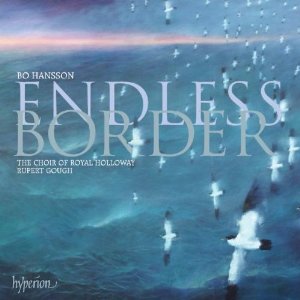BBC Proms: Aldeburgh World Orchestra, Elder
An orchestra of young musicians challenge their youthful contemporaries at the Olympics
Formed especially for the London 2012 Festival, the Aldeburgh World Orchestra does what it says on the tin: bringing together talented young musicians from across the world in a single youth orchestra. Under the direction of Mark Elder, musicians from 35 countries, including Jordan, Ukraine, Malaysia and Uzbekistan amongst others, joined together to perform a mixed programme of music from Mahler, Britten and Stravinsky, as well as the world premiere of Charlotte Bray’s At The Speed of Stillness.

 Endless Borders: Choral music by Bo Hansson The Choir of Royal Holloway/Rupert Gough (Hyperion)
Endless Borders: Choral music by Bo Hansson The Choir of Royal Holloway/Rupert Gough (Hyperion)